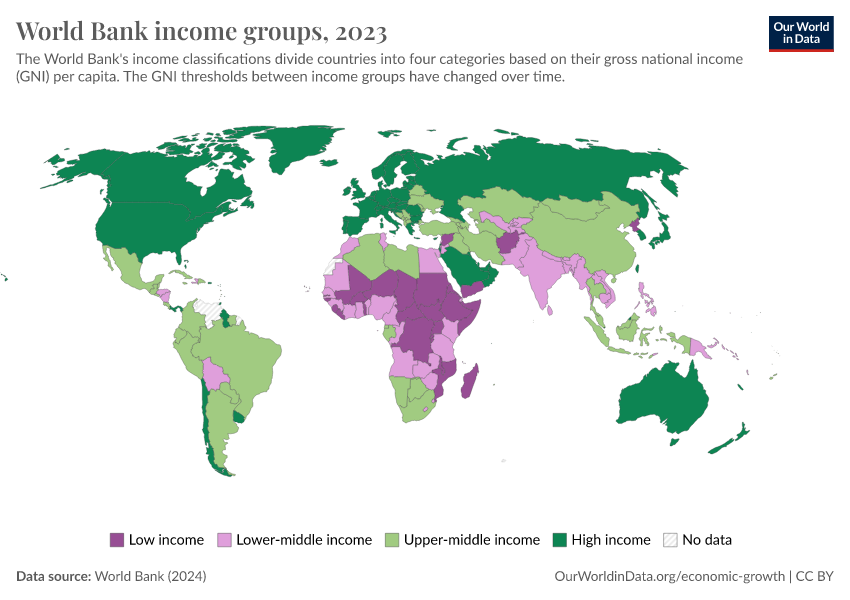World Bank income groups

What you should know about this indicator
- The World Bank creates a yearly classification of countries by income, for all countries with population over 30,000.
- This classification stays the same throughout the World Bank's fiscal year (from July 1 to June 30) even if the income data for a country changes.
- Low-income countries are those with a gross national income (GNI) per capita of $1,135 or less in 2024.
- Lower-middle-income countries are those with a GNI per capita between $1,136 and $4,495 in 2024.
- Upper-middle-income countries are those with a GNI per capita between $4,496 and $13,935 in 2024.
- High-income countries are those with a GNI per capita of more than $13,935 in 2024.
- Venezuela, classified as an upper-middle income country until the fiscal year 2021, has been unclassified since then due to the unavailability of data. Ethiopia is currently in a temporary status of unclassification.
Related research and writing
What you should know about this indicator
- The World Bank creates a yearly classification of countries by income, for all countries with population over 30,000.
- This classification stays the same throughout the World Bank's fiscal year (from July 1 to June 30) even if the income data for a country changes.
- Low-income countries are those with a gross national income (GNI) per capita of $1,135 or less in 2024.
- Lower-middle-income countries are those with a GNI per capita between $1,136 and $4,495 in 2024.
- Upper-middle-income countries are those with a GNI per capita between $4,496 and $13,935 in 2024.
- High-income countries are those with a GNI per capita of more than $13,935 in 2024.
- Venezuela, classified as an upper-middle income country until the fiscal year 2021, has been unclassified since then due to the unavailability of data. Ethiopia is currently in a temporary status of unclassification.
Sources and processing
This data is based on the following sources
How we process data at Our World in Data
All data and visualizations on Our World in Data rely on data sourced from one or several original data providers. Preparing this original data involves several processing steps. Depending on the data, this can include standardizing country names and world region definitions, converting units, calculating derived indicators such as per capita measures, as well as adding or adapting metadata such as the name or the description given to an indicator.
At the link below you can find a detailed description of the structure of our data pipeline, including links to all the code used to prepare data across Our World in Data.
Reuse this work
- All data produced by third-party providers and made available by Our World in Data are subject to the license terms from the original providers. Our work would not be possible without the data providers we rely on, so we ask you to always cite them appropriately (see below). This is crucial to allow data providers to continue doing their work, enhancing, maintaining and updating valuable data.
- All data, visualizations, and code produced by Our World in Data are completely open access under the Creative Commons BY license. You have the permission to use, distribute, and reproduce these in any medium, provided the source and authors are credited.
Citations
How to cite this page
To cite this page overall, including any descriptions, FAQs or explanations of the data authored by Our World in Data, please use the following citation:
“Data Page: World Bank income groups”, part of the following publication: Max Roser, Bertha Rohenkohl, Pablo Arriagada, Joe Hasell, Hannah Ritchie, and Esteban Ortiz-Ospina (2023) - “Economic Growth”. Data adapted from World Bank. Retrieved from https://archive.ourworldindata.org/20251021-211801/grapher/world-bank-income-groups.html [online resource] (archived on October 21, 2025).How to cite this data
In-line citationIf you have limited space (e.g. in data visualizations), you can use this abbreviated in-line citation:
World Bank (2025) – with major processing by Our World in DataFull citation
World Bank (2025) – with major processing by Our World in Data. “World Bank income groups” [dataset]. World Bank, “Income Classifications” [original data]. Retrieved February 27, 2026 from https://archive.ourworldindata.org/20251021-211801/grapher/world-bank-income-groups.html (archived on October 21, 2025).